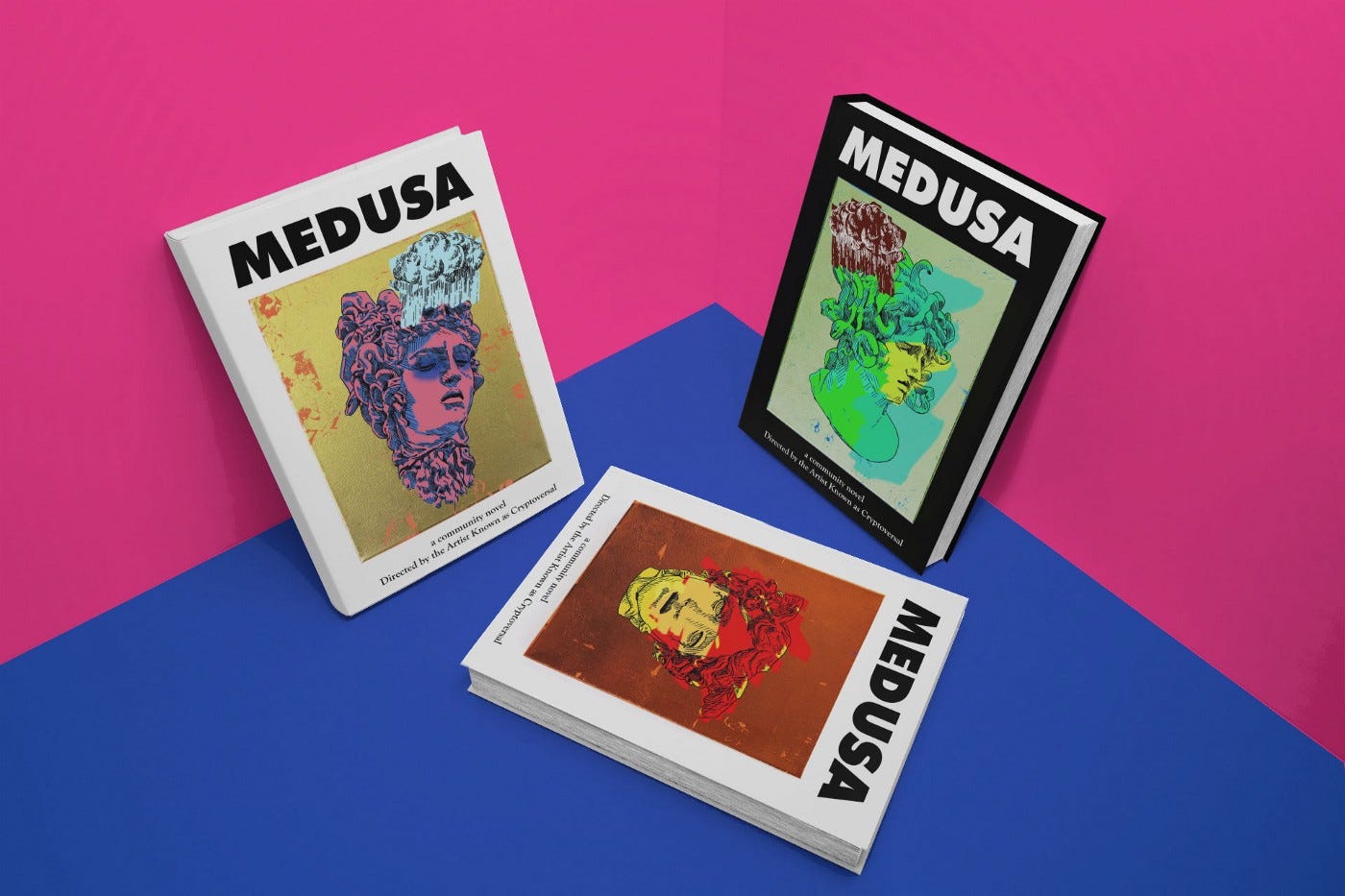The Cultural Miasma of Johnny Depp and Amber Heard
I got quoted in Vanity Fair. By Monica Lewinsky. Also: Welcome Wordler fans!
For those of you subscribed to my Wordler Stories on Cent’s app.bio site, you will also be receiving my semi-regular Mytholoversal Newsletter. For those who aren’t subscribed to Wordler Stories, more on them after a bit of mythology…
From the “Mythology Pops Up In the Most Random Places” file…
In the recently concluded Depp v Heard defamation case, a jury concluded that once-married actors Amber Heard and Johnny Depp each made statements maliciously intended to harm the other, and that each had caused millions of dollars’ worth of damages to the other’s reputation and earnings. In contentious and sometimes lurid proceedings, both sides laid out testimony seeking to prove that the horrible things they’d said about each other were more deserved than defamatory.
The trial was a train wreck that captivated millions. Many people staked out positions on who was right, who was wrong, and how the events of two people’s lives could be generalized to society as a whole. Social media translated and remixed every moment of testimony into a stream of toxic memes and viral videos.
Vanity Fair tapped Monica Lewinsky to provide her personal insight into what it’s like when the glare of the public eye is focused on your private relationships and intimate moments. As Lewinsky writes, if you want to know her qualifications, “Google: 1998.”
Lewisnky’s essay builds toward an indictment of modern American culture. “We are guilty,” she writes, after referencing the Ancient Greek concept of “miasma.”
Then, for the capstone of her thesis, Lewinsky quotes me.
Let me say that again…
Lewinsky quotes me:
According to science fiction author Greg Fishbone, founder of the microsite Mythoversal, “for the ancient Greeks, a miasma was a moral taint that hung over a person, family, or city after the commission of a crime. The miasma could cause crop failures, cattle disease, stillbirths, and other plagues until it could be dispelled by sacrifice, purification, or upon the death of the guilty party.” What we have now, arguably, is a “cultural miasma.” We are drenched in the taint of the dirt and aggression of the social media wars. The obsessive chatter around the Depp–Heard trial is just one small example of the ever-expanding, ever-demanding search for schadenfreude and titillation.
No matter whom the jury’s verdict favors—be it defendant Heard or plaintiff Depp—we are guilty.
Which is cool, and random, and so weird that it felt like someone had turned my life into a Mad Lib. If you’d asked me to name a celebrity, a publication, a story in the news, and a topic I’ve written about, I’d never have come up with Monica Lewinsky, Vanity Fair, a celebrity defamation trial, and that one time I used the word “taint” in a sentence.
Cultural Miasma
Since she opened the door, let’s talk about Lewinsky’s thesis of “cultural miasma.” Is there a pollution that hangs in the air over our culture, corrupting our thoughts and cursing the outcome of our actions? If so, can mythology lead us to the source of that miasma and offer a solution for fixing it?
In the Greek story of Oedipus, a newborn child is fated to kill his father and marry his mother. Upon hearing this prophecy, the boy’s parents order that he be killed, but he survives and returns, decades later, as doomed infants always have a way of doing. Not knowing his own identity, Oedipus kills his father in history’s first recorded incident of road rage, solves a riddle to earn his mother’s hand in marriage, and fathers four children/half-siblings with her.
As a result of these transgressions, a miasma extends over all of Thebes. Crops fail, mothers miscarry, the water supply turns to poison, and everybody suffers.
The miasma doesn’t care that Oedipus lacked the self-knowledge for his deeds to be intentional. The miasma doesn’t care that the Theban public had to suffer worst of all for the misdeeds of their king. The miasma doesn’t even care that Oedipus was guilty of only what the Fates had manipulated him into. In a cosmology where every emotion and action is personified as a deity, the miasma is an uncaring cloud.
Miasma in Ancient Greek mythology was a symptom rather than a cause. It was a sign that some mortal corruption had upset the natural order of the cosmos, and the entire community would suffer the consequences, often for multiple generations until somebody hit the reset button.
Lewinsky views the toxicity that spreads through social media as a kind of miasma, a symptom of moral corruption that’s upset the natural order. As with classical miasma, this cultural miasma spreads regardless of anyone’s willful intent to cause harm, the ones who suffer most are not necessarily the ones most responsible, and the root causes are a brew of such pre-existing conditions: hatred, bias, corporate greed, political corruption, geopolitics, and a lurid interest in what Lewinsky calls “courtroom porn.”
Unlike a classical miasma that descends upon the masses from the misdeeds of a king, this cultural miasma arises from the general public. “We are guilty,” Lewinsky judges. But if we are all guilty of causing and perpetuating cultural miasma, what sin are we guilty of?
I’d argue that it’s the sin of engagement.
The seven- and eight-figure monetary damages assessed against both Depp and Heard took account of reputational damage and lost earnings caused by their respective statements. But those eye-popping damages were only that high because of the obsessive attention we pay to the statements and alleged misdeeds of celebrities. Disparaging videos only go viral because we watch them. Gossip rags only publish trash-talk because we fall for the clickbait.
Everyone deserves their privacy, including (and maybe even especially) celebrities. It’s not just a nice-to-have, either. Privacy has been an implicitly recognized Constitutional right since Griswold v. Connecticut (1965). It was the basis of Roe v Wade that a private citizen’s pregnancy, and how it’s handled, is none of the government’s business. The right to privacy and a generalized respect for privacy offer powerful protection from much of our collective cultural miasmas.
We each have the power to dispel a bit of the miasma cloud by avoiding clickbait, boycotting the gossip rags, and changing the station. We need to stop feeding the beast by taking better control of our media diets, and by guarding our own personal information against those who would package it up for exploitation.
What might happen if we don’t? Let’s check back in with Oedipus…
After blinding himself and abdicating the throne, and after the suicide of his mother/wife, Oedipus had a chance to rid Thebes of its miasma. Instead, he laid his curse upon his ungrateful sons. Freed of personal guilt, Oedipus wandered off in the general direction of Colonus and left his kingdom to descend further into corruption and ruin. The walls of Thebes, which had repelled every invasion up to that point, were breached by the Epigoni, and the city was destroyed.
So what do you think? Is the concept of cultural miasma a useful way to think about social media? Is there a solution to be found? Let me know in the comments.
—Greg R. Fishbone, Mythology Disruptor
Introducing Wordle Quest
“Every morning, a Wordler is chosen to quest for the one magic word that can protect her village for another day…”
Instead of obsessing over various celebrity trials and contributing to our collective cultural miasma, why not use social media for some harmless entertainment?
I’ve been playing a daily word puzzle called Wordle. You might have heard of it. After each game, I started sharing my scores on social media with a grid of colored blocks. Here’s today’s result:
Wordle 360 3/6
⬛🟨🟨⬛🟨
🟨🟨⬛🟨🟨
🟩🟩🟩🟩🟩
If you’re familiar with Wordle, the blocks that each game generates will tell you a daily story of each player’s luck, strategy, and occasional misfortune. In this 360th Wordle, I got the correct answer in three guesses after finding an unusual number of out-of-place letters. This three-line story has a lucky beginning, a frustrating middle, and a victorious ending.
The next natural progression for me was to use each day’s scorecard as the basis for generating a character whose appearance is determined by my Wordle guesses and results. Here’s today’s Wordler:
The image combines a “three guesses” background, “five green tiles” shirt, “seven yellow tiles” skin, and “three black tiles” hair to create a “too much time on my hands” Wordler. This one is a cat-girl for no apparent reason. The flag is to celebrate Flag Day here in the U.S.
Happy Flag Day, everyone!
These characters star in their own Wordler Stories, bits of daily flash fiction fluff that can be found on my Cent profile. Together, the portraits and stories form the Wordle Quest project.
Each day’s Wordler Story can be collected for free on Cent by the first 888 claimants. Yes, the Wordlers are NFTs, but no, they’re not climate-destroying grotesques promising to make you crypto-rich. These are just-for-fun collectibles recorded to the most energy-efficient blockchain available with carbon-responsible offsets provided by Cryptoversal Books. And whether you choose to collect them or not, they’re always free to read.
You can review the collection Details and Roadmap on Baxter’s NFT Bookstore Blog. Wordle Quest and Wordler collectibles are not endorsed by or associated with the New York Times or its affiliates.
Medusa Update
The Medusa Writer’s Studio is a literary collaboration between Cryptoversal Books and the Medusa Collection. The community-directed novel under development is an attempt at voicing a long-repressed part of a once-diverse canon.
The community has asked for a full-length novel version of Medusa’s story that can be described as Circe meets The DaVinci Code. Progress has been slow but the initial research and plotting stages are complete and a draft chapter is available that starts the modern frame.
I will provide further updates as the novel progresses toward publication.
—Greg R. Fishbone, Mythology Disruptor







